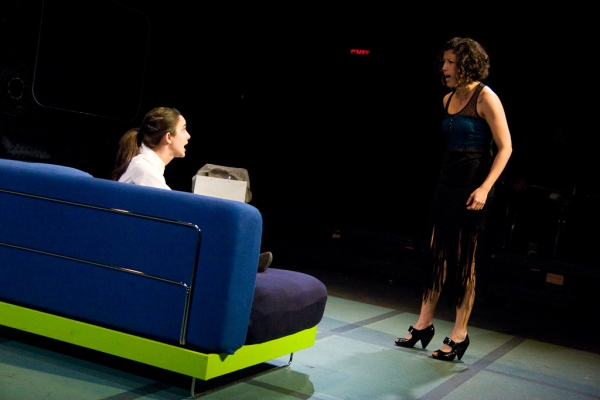DEINDE Review: Julia Barclay, Somewhere in Transition

Photo by Justin Hoch at jhoch.com. Pictured: Rachael Hip-Flores, Sol Marina Crespo. Post by August Schulenburg.
It’s always exciting to come across a new reviewer/blogger, particularly when they are theatre artists themselves. Unfortunately, Julia Barclay may have begun with the wrong Flux show – I have a hunch from her DEINDE review she would’ve connected stylistically with Menders or Ajax in Iraq more. She gamely declares her interest in non-naturalistic theatre immediately, and acknowledges her experience was different than the rest of the audiences.
Her critiques focus on three main points: that the play feels like a TV show, the characters are subservient to the plot, and the acting style is too intellectual.
For the first point, it’s undeniable that the play is stylistically influenced by TV. There are sharp cuts, short overlapping scenes, and yes, witty banter (though I hope the banter is particular to each character, unlike many shows where all the characters have the same voice).
The character critique befuddles me, however. In TV, the main characters must burn slowly, as we need live off their light for many episodes. In theatre, the characters must consume themselves in a few short hours. In DEINDE, most of the characters make major, difficult choices, and change repeatedly through self-discovery on their way to immolation. The idea of them being “recognizable, likable enough but not challenging in any way or implying any kind of depth” feels untrue – the scientists in particular seem more challenging than likable.
She ends on the interesting idea that the play lacks a visceral sense of theatrical presence. I have questions about this, because calling a play “theatrical” is like observing wine is made of grapes. Even in the most naturalistic play, the presence of the actors and audience in real time changes everything. Violence, especially: I have a hard time watching very violent plays but am much less troubled by violence on film. The mind meld of Jenni-Mac would likewise be less thrilling if it lay on the far side of an editing process. And of course, recorded music cannot touch the intensity of the real human voices singing that end the play.
That said, DEINDE is less self-consciously “theatrical” than most of my plays, and I think this is because the experimentation takes place primarily in content instead of form. A highly stylized staging might diminish the clarity of difficult ideas. I’d like to believe that the metaphysical strangeness occurring within the story rather than without does not make the play any less experimental.
As strange as it may sound (and unintentionally boastful), the play feels closest in kinship to Macbeth. We uncovered many parallels in between the two texts in our process: the seduction of power, unintended consequences, the necessity of sleep, the power of dreams, bloody instruction returning to plague the inventor, a Mac against a Malcolm – there is even a quote from the Scottish play in DEINDE. Jenni’s final plea to Malcolm almost sounds like the child of the Tomorrow and Tomorrow speech, though they serve different purposes. Replace the war with the virus and the witches with the device, and as different as they are, they haunt each other, a little.
It seems to me that however much the clothes of DEINDE plays homage to sci-fi, its bones are made of the heath and blood of a Scottish tragedy. What do you think?




Recent Comments